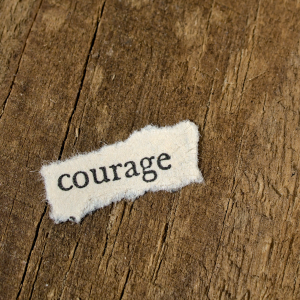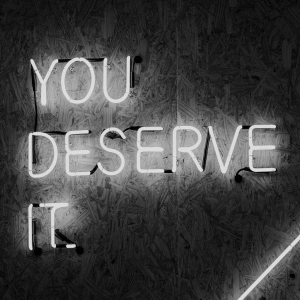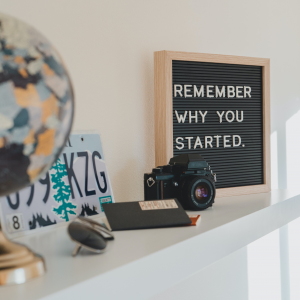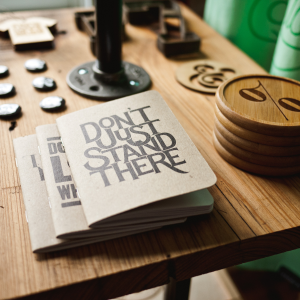Sometimes life is messy. It’s not comfortable, but it happens! Listen to this episode to hear all about the “messy middle” and what you can do to navigate life when life is messy.
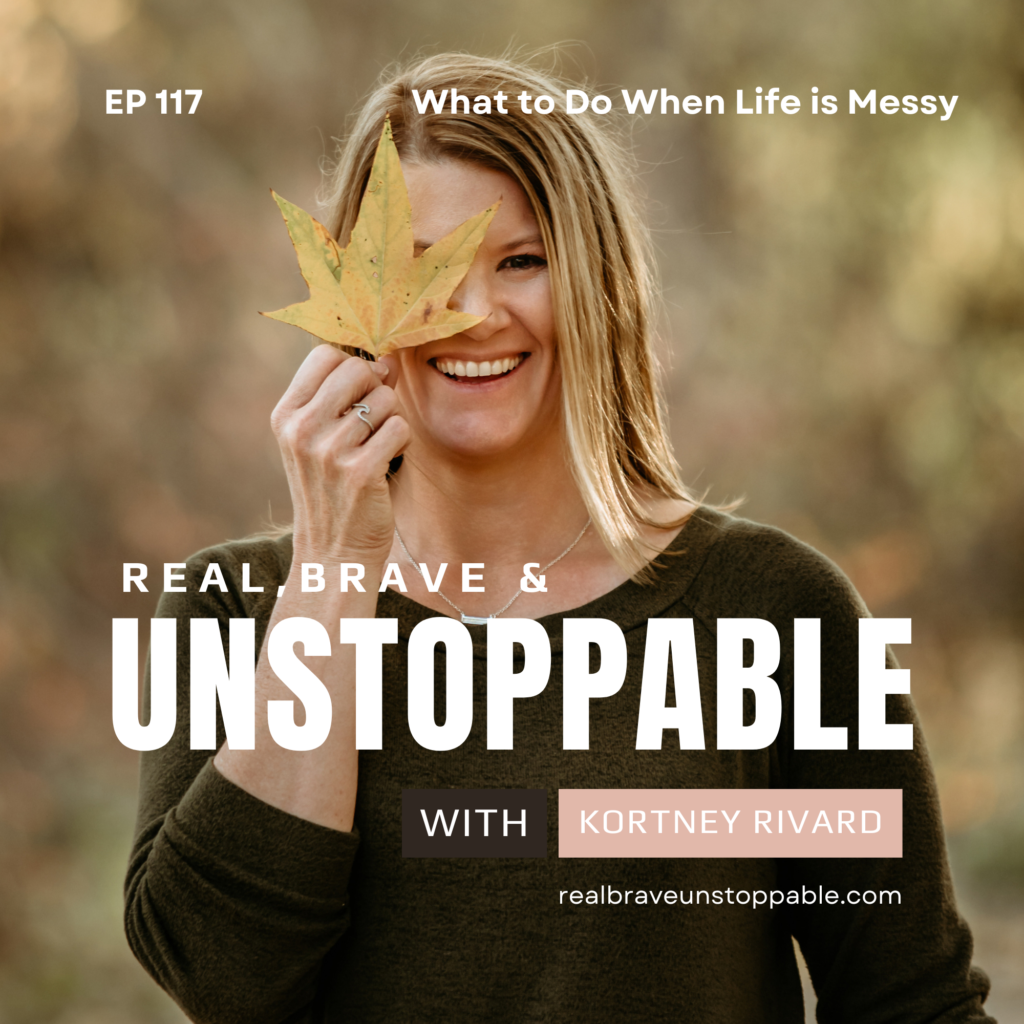



Show Notes:
Welcome to Episode #116 of Real, Brave, & Unstoppable!
Life is full of surprises, isn’t it? Some of them are welcome and some aren’t. Life is messy sometimes! The fact of the matter is that there is always a gap between reality and the way we want things to be.
In this episode I’m diving into times when life is messy – the “messy middle” and how to get through it.
Have a listen and don’t forget to leave a rating and review!
Resources

How to Create the Life You Want FREE workbook
Click HERE

Podcast host and life coach, Kortney Rivard, helps women who want to live more exciting, more fulfilling lives get out of their own way and start creating a life they love.. Book a call to chat about how you can start changing YOUR life today.
CLICK HERE
Support the show (https://www.buymeacoffee.com/kortneyrivard)
Other episodes:
- Ep 122: How to Take the High Road When People Say Mean Things About You
- Ep 121: 5 Ways to Make the Mirror Your Friend
- Ep 120: Getting Back on the Goals Bandwagon – Setting Better Goals
- Ep 119: Slow Down! How to Embrace Getting Still and Waiting Patiently
- How to Fix Your All-or-Nothing Thinking
The Real, Brave, & Unstoppable full episode catalog
Transcript:
Episode 116:
Hello and welcome friends to episode 116 of Real, Brave, Unstoppable, on navigating times when life is messy – living in the quote-unquote messy middle. Or navigating the gap between the way things are and the way you want things to be. I was coaching a client last week who recently, got back together with her partner after some time apart. And she’s got a lot of feelings of betrayal and hurt. Also has a hard time trusting that her partner will really show up for her in the way that she needs and wants him to. I coach a lot of people on this kind of thing. The, should I stay or should I go question? It’s really a difficult thing to coach people through because they tend to want to set a goal around making a decision, but making these types of decisions is really hard and uncomfortable. And what tends to happen is that being in indecision in a relationship usually means that one person has like a backdoor. In case things get rough there’s an exit. So we talked through this back door or like safety valve. And she mentioned that she starts to go there when there’s a problem in the relationship.
So, having a backdoor is like a way of avoiding the discomfort that comes with a problem. Now, caveat, I’m not talking about abusive relationships or relationships that I’ve really truly run their course and things just aren’t solvable any longer. I’m just talking about, you know, normal conflict. When things get sticky, our brain is like, no, get out. This doesn’t feel good. You’re supposed to feel good. And flipping between I’m in and I’m out creates this like distance in a relationship, and so learning how to live in this like messy, middle of feeling uncomfortable can feel really hard. (life is messy!) And by the way, this episode is not solely on relationships. This can apply to anything and we’ll talk about some other examples in just a minute. So, what is this messy middle, or sometimes I’ll refer to it as”the gap”. But, the messy middle is the space between the way things are, like reality, and the way you want things to be. So our human tendency is to be doing whatever we need to do to close that gap. So, you know, we feel discomfort when things aren’t the way we want them to be. So there’s discomfort on one end of it, and we’d rather not feel that. So we do what we need to do to get rid of the discomfort. It’s kind of like, we want to just give up all the patience and skip the journey from one end of the gap to the other… we just want to arrive. I mean, let’s face it feeling uncomfortable, whether that shows up as an uncomfortable emotion or just physically feels uncomfortable, like that kind of sucks. Right?
So, you know, no one wants to feel crappy or uncomfortable and it’s natural to want to avoid that feeling rather than lean into it. Not being where we want to be is what creates that uncomfortable feeling. I quote this a lot on the show, but author Pema Chodron says that the reason we suffer, or the reason life is (or feels) messy is because we cling to the way we want things to be or the way we think things should be. When we’re attached to that outcome and we don’t get it, we feel bad, you know, maybe bad has kind of a umbrella emotion. It’s one of the ones we go to, but what does, you know, a bad can be sad. We might feel inadequate, resentful, frustrated and so on. By the way it’s really helpful to… there’s a website called feelingswheel.com. Like a wheel, like on a car feelings wheel.com. It has a feelings wheel that has like the major emotions in the middle and then different, like it just kind of nuanced emotions as you go farther and farther out the wheel. It’s super helpful. I highly recommend if you want to dive into some of this work it can be really helpful to just to know some of the more nuanced emotions instead of just bad, sad, mad.
Anyway. So when we feel those uncomfortable emotions or unwanted emotions, you know, a lot of times we hook into them cause we judge them as bad. I don’t want to, I don’t want to feel this. I don’t want to feel when life is messy. And pretty soon they’re starting to run the show. They dictate our behavior or like, you know, how we show up to life. And, I’m going to give you some more examples of this gap. I used the relationship gap above as an example, but other examples could be, let’s say you interviewed for a job and you’re waiting to hear about it. So you experienced anxiety or worry, maybe stress over not knowing. So that messy middle is the space between not knowing and wanting to know. Right? So once you know the feeling of anxiety or whatever it goes away, and if you don’t get the job, then it’s just a new, different, messy middle. Intense conversations where two people don’t agree, the messy middle is between your opinion and wanting someone to agree with you. The tension that comes with having something unresolved is uncomfortable for most people. Related to health, wanting to lose weight could be an example. Like if you don’t like your body, you feel really sluggish, low energy and want to be in better shape, like what you see in the mirror, have more energy, be happy with your fitness level. The messy middle is the discomfort that you feel when you wish you were different. I think that’s a really good example.’cause it, it illustrates like how accepting yourself. on that journey so important and that’s kind of what this all is. It’s like accepting that middle. It doesn’t mean it won’t change, but you’re just accepting what you’re working with at the time.
There’s one more example of what to do when life is messy. I had a client the other day, who is experiencing sadness over the realization that she would likely never be a parent and her messy middle is really the sadness that she feels from the gap is between not having kids and wanting kids. It’s that wanting or wishing she could, but knowing she probably won’t have them. So the, the gap or the messy middle is kind of like a… it’s almost like a limbo land or sometimes I call it a swamp. Also I have tons of great metaphors or words for this space. But it’s kind of like limbo because we’re dealing with some uncomfortable stuff that typically we want to get out of. So our brain is alerting us constantly to the fact that. We’re not where we want to be or where we should be. Quote-unquote. And then we have all kinds of thoughts about that too. And then that creates more uncomfortable emotions and we have to be really intentional about this place. That doesn’t feel good. It’s really natural that this messy feeling or uncomfortable gap exists. Our brains, you know, we don’t like uncertainty. Interestingly enough, uncertainty is actually a human need. The need for surprise and novelty. Otherwise life gets stagnant and boring.
That’s just a side note, but we really like to control how much of, how much uncertainty we have in our lives. So when things are uncertain (and life is messy), we get really uncomfortable. So think about it when you have something to talk to a partner about, and you’re a little scared to like broach that subject because you’re not really sure how he or she will react, or you’re up for promotion and it’s uncertain as to whether or not you’ll get it, you just had a disagreement with a friend and you don’t know how things are going to end up. Those are all examples of uncomfortable situations that we might find ourselves in. And also, anytime we encounter something new in life, like new people, new activities, new environments, we might feel varying degrees of discomfort. It’s uncomfortable to get out of your comfort zone, duh, obviously, right? And I also know that in these moments, this is where the growth happens. You gain confidence that you can navigate that middle space or the gap in spite of the discomfort. You learn to trust your resilience? You learn to dig deep and find resources you didn’t realize you had. And go back and listen to episode number 114 about chaos for more on that really good episode.
So, back to this messy, middle, when life is messy, we’re talking about here, what does it look like? What is the gap look like and how do we navigate this? Well, it can be a short gap. Or it can be a long gap. Meaning, it can be a gap in a moment between feeling an emotion an emotionally driven reaction. It can look like a long gap where you’re having to wait to know what an outcome is going to be. And it can be somewhere in between those two as well. It can look like the emotion that comes up when your partner triggers you. Sitting with that. It can look like feeling ashamed that you acted out at someone. Feeling bad about yourself because you didn’t do something perfectly. It can look like feeling unsettled because there’s an unresolved issue in our relationship or overwhelming worry, because you have too much on your to-do list. Sadness because you suffered a loss of some sort. Feeling unimportant in a relationship. All of these things are spaces where we just don’t feel the way we want to feel. But here’s the thing about the messy middle – when life is messy – is that no one likes it. Duh. It doesn’t feel good. So we kind of tend to make it an enemy. You know, we judge it. We make the feelings we feel in that messy middle the bad guy. And we become all about avoiding that. So what’s wrong with that? You ask avoiding, there’s nothing wrong with it because sometimes we need a break from a really hard emotion.
But what happens over time is that we get in the habit of avoiding whatever that experience is and in coaching and psychology we call that experiential avoidance. But when that becomes a habit, it doesn’t really serve us over the long-term. So, you know, when we do feel an emotion, we don’t like, so for example, we feel the feelings of frustration or anger come up in a conversation and we might snap. The snap will create a new emotion, but it’s helped to relieve that initial one. So maybe you feel feelings of shame because you disappointed someone. So to avoid the feeling of shame, you go into people pleasing or fixing. So you’re not disappointing that person anymore. Your brain tells you that as long as you fix it, you won’t have to feel that awful feeling of shame. Now the interesting thing is you can imagine if you go into people pleasing mode and you’re overextending yourself to make sure you don’t disappoint everyone, then you have all kinds of different emotions that come up, but you know, that might come with stress or anxiety or something like that. So the thing is, the point you’re you maybe are catching onto this as I’m talking here. But there’s always going to be a hard emotion. Even if you avoid one, you don’t like, or, you know, if you avoid a situation, you don’t like, there’s always going to be a hard situation. So you might as well learn how to, how to exist in this gap.
I have a client that’s working on her relationship with her parents and her mom is a little bit emotionally immature. And my client often gets really annoyed with her. Her avoidance mechanism is to withdraw and create this boundary with her mom, which is fine, however, and, and, and, you know, healthy, however, after further discussion, we figured out she was really letting her annoyance dictate how she showed up for her mom, which was withdrawing. And it helped her avoid further annoyance, which is sometimes totally appropriate. But the key part of this is that the emotion was actually dictating how she showed up. So when we explored this a little more, we realized that she didn’t want to sit with that emotion of annoyance. And if she was able to hold that without judgment, she could decide how she wanted to handle the situation from a more objective standpoint that was in line with her values. Like what’s important in how she shows up for her mom without letting being annoyed, run the show.
So it’s really important to be able to acknowledge the emotions when life is messy. Well, first notice them. And then actually just acknowledge them. And we’ll talk about that in detail in a minute, but it’s also really important to normalize them or neutralize them because what happens. Is that we get into judgment of them. Labeling them good or bad, and that doesn’t help us make space for them. And that that’s what helps that. That’s what pushes us to avoid them. So, how do we make space for all of the crap that’s in the messy middle? How do we lean into whatever it is that shows up there? Well, this is like so much of this is a practice. It’s not always easy and you will never ever get it perfect. So the first thing we start with is awareness. I always say awareness is half the battle and it really is. So why is this messy middle hard? Because we have a judgment that it’s hard and negative and unwanted. Well, of course, it’s going to suck if we look at it that way. Right? So being in the space is really uncomfortable. Like I we’ve… you’re you’re figuring that out as I talk, I’m sure I’ve said that many times, but the judgment that it’s bad creates feelings that feel bad. So let’s talk about some strategies for embracing this discomfort or at least accepting it and leaning into it.
So the first is acceptance of the discomfort. You can think of this as acceptance of an entire situation or parts of it that are out of your control. Or you can also think of it a little more granularly. Like as willingness to make space or willingness to feel an uncomfortable emotion or physical feeling or unhelpful thought even. So let’s talk about how to do this. And I’m going to talk about this on a more granular level, like how to accept unwanted emotions, because this is really the foundation or like the building block of accepting bigger things in situations. So one of my favorite ways to stop fighting this messy middle space is something I call the three ends. Notice name and neutralize or normalize. Notice as simply tuning in to the present moment and noticing what you’re thinking, what you’re feeling, what you’re doing. Just what what’s present. Naming is simply naming the emotion or unhelpful thought. Language is really important here. So listen up instead of, for example, saying to yourself, I’m angry, you really want to shift that to like noticing the experience of it. Like, so the the language might look like I’m noticing the feeling of anger, or I notice I’m having some angry feelings. Or there’s anger, or I’m noticing that I’m feeling angry. Um, say them, say those, you know, say both ways out to hear a loud to yourself. Like I’m angry versus I’m noticing the feeling of anger. Like say those out loud to yourself, like take a minute and do it right now.
And do you notice the difference? It feels a little less heavy. It’s more like I’m a client. That I was working on with this the other day said. It seems a little more transient when you say it that way. And I loved how we described that because yeah, it feels like when you say I noticed anger. It’s just like, oh, there’s anger. There might be something else coming soon. I don’t know. But it just, it feels like it’s not like I’m angry. Just feels like whoa…Pretty big, right. So neutralizing or another way to look at it as normalizing. It’s really just creating a really neutral stance from which you see this emotion. It’s like acknowledging that it’s okay to feel this way. It’s validating yourself for having the feeling like, it makes sense. So I would have this feeling, of course, I feel angry. So-and-so just really hurt me. Like of course I feel hurt or of course I felt frustrated. Anyone would feel that way. Given what’s happened. you know, really validating yourself for having the feeling. It’s just what you’re working with right now. No judgment, nothing to fix here. You don’t need to fix the emotion. You don’t need to. Go to great lengths to change it. It’s going to change on its own. Just let it do its thing.
So let’s work with a life is messy example. My partner and I had a pretty big argument the other day. One of many over the last couple of weeks, so much fun. I was really angry at him as well as really frustrated at how invalidating he was to me. And I noticed that I was feeling really jittery. Like there was like, like the first thing that I like to do is really when I’m trying to practice this is really get into my body. Like I felt like there was a hole in my chest and in my stomach. Um, and then I noticed emotions like anger, frustration, sadness, and even like defeat. So following this framework, you know, I noticed, I noticed it. I was just told you what I noticed. And then naming looks like I notice anger. I also notice some frustration and sadness and I notice I’m feeling a sense of defeat. I’m also noticing some physical sensations, like a pit in my stomach and a hole, like a hole in my chest. And I’m also noticing I have a little anxiety. Or I’m experiencing a little anxiety. That’s what that looks like. And the neutralizing or normalizing might look like. Yeah, these emotions are normal. We just had a pretty big argument. I don’t agree with things he said, and he refuses to listen to what I have to say. And he said some pretty mean things to me. So of course I would feel these things and it’s okay to feel that way. Makes sense. And, also the goal here, like I said before is not to judge our experience or to feel the need to fix it or push unwanted emotions away. So if I notice I’m wanting to do that, I might really focus on sticking with the emotions or even the physical part of it. You know, really leaning into them and making a point to feel them. Or even the physical sensations I’m experiencing. Not easy to do all the time because it is uncomfortable. And most of us have been taught to avoid what doesn’t feel good. I mean, that’s pretty normal, right? Yes, totally normal.
Another thing that’s helpful to think about when life is messy is working on adopting more of a growth type mindset. Um, I mentioned that the goal of acceptance is well to accept, not to judge or fix something to avoid feeling crappy or uncomfortable. So remember, our thoughts, create our feelings. So it’s worth looking at our beautiful brains and what they’re contributing to our feelings about being in this messy space. For example.”I hate feeling this way or my life sucks”. What might be a more helpful thought? Well, first of all, acknowledge that yeah, what you’ve got to work with right now, isn’t ideal. And that’s okay. I mean that’s life sometimes. And then a simple shift, like”things feel really hard to me right now. And this is temporary.” Or another thing that I like to adopt as a mindset of thinking, like,”what is this trying to teach me?” Or”what can I learn from this instead of why is this happening to me?” Or”why is this happening?” It’s really a great shift to work on. And there’s a lot of great stuff you can do there.
Also important, you know, like I said, it is important to acknowledge that something is hard though, you don’t have to flip to like rainbows and unicorns when life is messy. It’s it’s something can suck, but also you can find a better mindset about it. So I want to really stress here, it’s, it’s really important to note here that we don’t employ these techniques or skills to get rid of the shitty feelings or the uncomfortable stuff. We use these skills to make it more bearable to let them hang out while they need to hang out. So one way I like to really think about this is, I think it’s kind of a good analogy is let’s just pretend that you are, maybe you’re going on a trip and you have a ton of stuff to. Do you have like cleaning to do packing, to do you’ve got you gotta line up stuff for your pets, for pet center and all the things. And, you gotta really early flights. You gotta get it all done. And then some friends that kind of annoy you, they stop in to say hi. It’s not that they totally annoying. It’s not that you don’t like them, but like, you’re like, it’s really annoying that you just showed up right now because I have so much stuff to do, but you want to be nice. And you’re, you’re happy to see them too. So you’re like, okay, I’m really busy, but come on, come on in any way, but I’m going to keep doing my stuff and you can hang out while I do my stuff, but just know that I’m, I’ve got lots to do. So it’s kind of like that. These are emotions that are uncomfortable, they’re like hanging out with you. And you’re just kinda accepting they’re there while you keep doing what you need to do to carry on. Like it’s not avoiding them. It’s not, you know, it’s sort of like, okay, let me make space for you to be here while I make space for myself also to get my shit done.
Okay. So another thing that I like to ask myself when life is messy is, or actually, ask my emotions is, is there something that my emotions are trying to tell me? Feeling disrespected, for example. Might be trying to tell you to look at your boundaries. There might be deeper learnings to discover by exploring your emotions further. This is where friends that feelings wheel I told you about earlier. That’s what this is where that’s so helpful. Because if you can get to a nuanced emotion, like it might really give you some information about like, why am I feeling this way? And it can help you accept that emotion a little easier. Because, you know, for example, let’s just say somebody crosses a boundary. And, you know, you feel happy about it. Well, that’s not super healthy cause we need boundaries. Right. So think about it that way. Emotions do serve a purpose. If you haven’t ever seen the movie Inside Out, by the way, go watch it. Talks about this concept exactly. So sometimes the gap creates.
So the, you know, when life is messy, that messy space, messy, middle space creates feelings that are really intense. And if some of these skills are new to you, they might be really hard to access because of this. Sometimes our nervous system is just too overloaded to go through this stuff and that’s totally okay. And normal. We just need to kind of bring it down regulate a little bit before this acceptance stuff is like accessible. So, the modality of DBT or dialectical behavior therapy has some really great stuff here to help with like distress tolerance. Surfing the moment, or the TIPP skill in DBT are skills that help you ride out the really intense portion of the the emotion. Remember emotions have a beginning, a middle and an end. And TIPP stands for temperature, intense exercise, paced breathing and paired muscle relaxation. So these are all ways that you can change your physiology and that can help you ride out that intense part of the emotional waves. You can get back to a place where you actually can employ some of the deeper awareness based skills that I’ve talked about. You can Google TIPP skills for more on, more info on that. And again, tip is T I P P. Um, distraction is also a good technique here. I’m looking at something pleasant, counting to five, looking around the room and naming five things that are black or white or soft or hard, whatever works for you. Naming an animal for each letter of the alphabet. It’s just some, you know, distraction.
Now, one of my clients actually asked me the other day. Well, isn’t that just avoiding? And I laughed. I was like, that’s a very good question. The answer is yes and no. It’s not really avoiding it. It is distracting from it until your nervous system can calm down. You’re still not trying to push away the emotion because once you get regulated a little bit, like, then you can access some of these other skills I talked about. You don’t ever want to get to the point where you’re just trying to push the emotion away all the time. Because like I said earlier, you’re always going to have uncomfortable emotions in life. So, you know, if you push one away, another unwanted one’s gonna come anyway. So like, you want to learn how to do this stuff. So those are some of the more tactical skills to help you like regulate before you get into some of the more awareness type skills, like, you know, mindset, thinking, thoughts. And then just acceptance of emotions.
So another aspect of being in this messy middle space, when life is messy, is having support. This is so important. Friends, family, a coach, or a therapist, accountability partners, mentors. You know, having some sort of support network is essential. Sometimes I talk to people and sometimes I feel like this too honestly, and they say that they have a hard time making close friends. And I totally get it. So try things like engaging in meetup groups or something like that, for hobbies that you enjoy. You know, really get creative and obviously like, you know, going to a meetup group, isn’t going to just score you a bunch of really close friendships. But it does help you, you know, being social and being with other people, can be super helpful. Just connecting. And then who knows what kind of friendships that you know, and relationships you’ll make through that.
So. As I mentioned before, we can think about the messy middle – when life is messy – as you know, just sitting with these hard emotions that come in there, in that messy gap. And, you know, I call it the messy middle because it’s uncomfortable. There’s all kinds of uncomfortable stuff in there. And so when we navigate it, sometimes at least for me anyway. It can tend to be really messy. Not pretty. So, um, we can also think about it, like I said earlier, like as broadly as a situation or a period of time. So, which includes all of the uncomfortable emotions. So, I’m going to share my own personal example about one of my messy middles and know that these periods are totally, totally normal in life. There are like seasons, like we all go through them. So when I was going through my divorce, it’s funny it’s been so long now. It seems kind of like an eternity ago, but also not that long at all. It was nine years ago that I discovered my ex-husband was. Having an affair with a guy. And, Yeah, nine years crazy. So my messy middle lasted several years. It was a tough time. Long, messy middle. So I had a really hard time accepting how uncomfortable that was. And at the time I didn’t know any of this stuff. So it made it a lot harder for me. But some of the things that I learned. Along the way we’re really important to you know, learning how, how to navigate my other gaps or messy middles, right? Like, When I was, oh, so there’s so many sub messy middles in there too. When I made the discovery, I just was so dysregulated. I had so many hard emotions and, you know, I gradually learned when I felt those through I mentioned dialectical behavior therapy. That was so helpful for me… To just tolerate those emotions, To be able to step back and, you know, a lot of the, like the tip skills I talked about, or even distraction techniques, self-soothing. Those were super important for me to be able to handle those emotions that I just wasn’t like equipped to be with. It helped me regulate a little bit and that, that just in and of itself took me a lot of practice to get to be able to do that. And, some of the thought work too, that was stuff that really was helpful for me. It took a while to really learn how to employ that. But, you know, and then also just, Just to point out the acceptance of those emotions. Like that’s really the first part of it. Emotions, when they’re really out of control can be really scary.
But the way that I got I’ll just kind of share some things about how I got through it. First of all, I did a lot of falling on my face. It’s funny. And that’s okay. Right. You learn from that. So at the time it felt really awful, but, I learned a lot from it. So yeah, so there’s that life lessons through failing. And screwing up. So also one of the things that stuck with me and was super helpful for me was learning that my thoughts are not facts. And the first book I ever read that taught me that was the untethered soul by Michael a singer. Um, so that was one thing that uh, helped me just really embrace that. You know, when I was having a thought that was telling me my life was over and things were, you know, never going to get better. Like I could, I could recognize, oh, that’s just that story that my brain is playing that, that narrative, that tape that my brain is playing for me. And that doesn’t necessarily, that’s not necessarily true. And actually when, I stopped to really look at those, those thoughts. it probably not true. Right? So just chipping away at that, working on that was another thing. And then, you know, just self-soothing skills, being, learning how to handle, like, be with an emotion, how to accept an emotion and ways to regulate my nervous system. And finally, once you learn those skills, I think like zooming out a little bit and, and knowing that, Hey, you know, we have these seasons in life that sometimes they just really suck. And they’re not going to last forever. And you know, it’s looking at where am I really hanging onto something that’s not serving me anymore. Where do I need to do a little bit of letting go?
And, the other thing that really helped me too, is thinking about there’s a quote. I don’t know where it came from, but the only way is through… is totally the most truthful thing ever. The only way is through. There’s no debating that. When you’re going through a hard time, the only way is to just go through it. There’s no shortcut. And every time you try to take a shortcut, you’re going to realize that the shortcuts a dead end. You’re just going to have to go back to the path anyway. So might as well just walk through it. So really knowing that and like, just what’s important to me. Know your values, take one step at a time, one foot in front of the other. Sometimes you’ll feel like super overwhelmed with your messy middle and that’s when you stop and say, Hmm, what’s important to me here. What direction? Like where’s, my values. That’s my compass. What direction do I need to be heading? And what’s a baby step. I can take here to get me unstuck? That’s super important. And one more thing that is so important and none of us do this enough, but self compassion. Learn to be nice to yourself. Learn to love on yourself when you’re going through these hard times. Really learn to do that. It’s so important. And so what’s the outcome of embracing all of this discomfort? It’s not like things are oh, perfect. No, it’s just that when I go through another time of feeling really uncomfortable, I have the tools to feel navigate that a little more gracefully. It doesn’t ever mean it feels good, or I like it. It just means that I can, I’m a little more of an expert. Or I’m a little more, you know, seasoned in terms of getting through that. So, you know, one thing with all of this is that, it’s sort of all about embracing what gets thrown at you too. I’ve mentioned letting go just a minute ago. And I think that’s a big part of this. It’s a journey. I mean, it sounds cheesy and cliche, but this is a journey. You know, embrace it, find the meaning in it. Even the tough parts where can you find meaning in those tough parts? And really, really, really important is to acknowledge the growth that you’re having and celebrate your victories no matter how big or how small. Celebrate your progress. Don’t sell yourself short. These messy middles, this is where like we’re totally out of our comfort zone and this is where the growth happens. This is where we become stronger. We become more resilient. We really learn more about ourselves and really Become the, you know, we’re just always, constantly becoming the people we’re meant to be, but this is where we take those big steps is where we really find out what were made out of. And honestly these tough times do bring meaning to life because without them, we wouldn’t know how to appreciate the times that are positive and and good and beautiful and, and, you know, feel good.
So I’m going to leave you with something to think about when life is messy. Think about your life and just kind of see where you are experiencing a messy middle. Whether it’s just simply like, you know, you’re waiting to hear if you got a job or not, and you feel anxious about it. Or, you have something unresolved with someone and you’re sitting there like not knowing how it’s going to end and that doesn’t feel good. Or I gave the example of my divorce, that messy middle, like maybe you have something just entirely huge or it just feels like a shit show in there. Like, just think about what messy middles you have in your life. And think about how you can apply some of these, you know, these skills to your own experience. And I would love to hear if this was helpful. Shoot me an email kortney at kortney rivard dot com. If you have any feedback about it, I’d love to hear what worked for you? What didn’t work for you? That’s always really helpful for me. And one more thing before I go, if you are enjoying the show, please, whatever platform you’re listening on, please leave me a review and a rating just helps other people find the show. I’d really appreciate it so i hope this was really helpful friends and i will see you next time.


